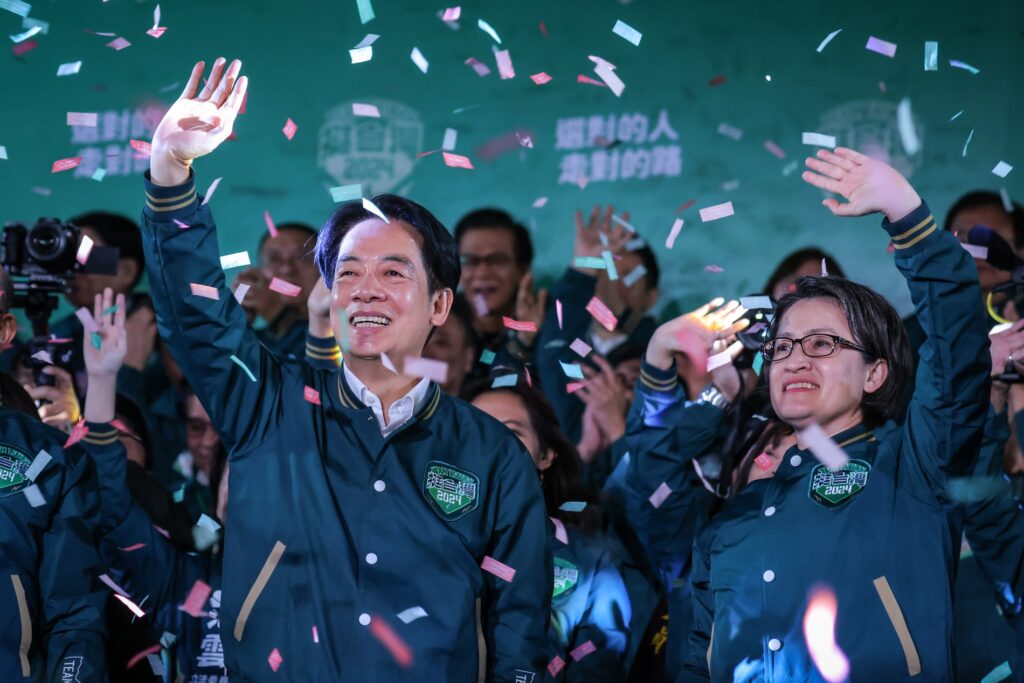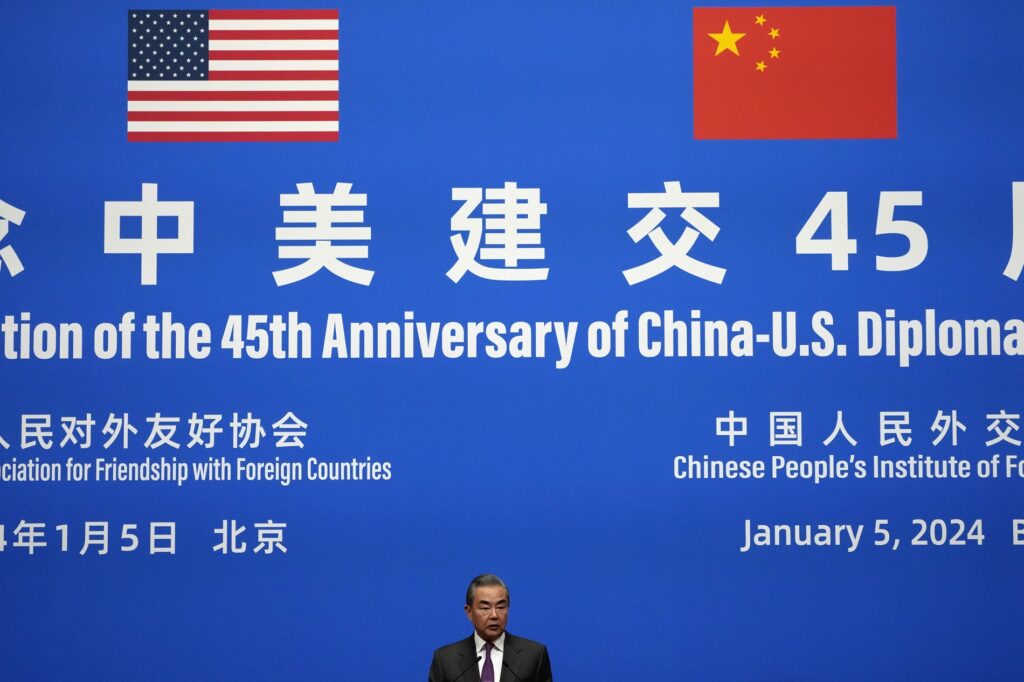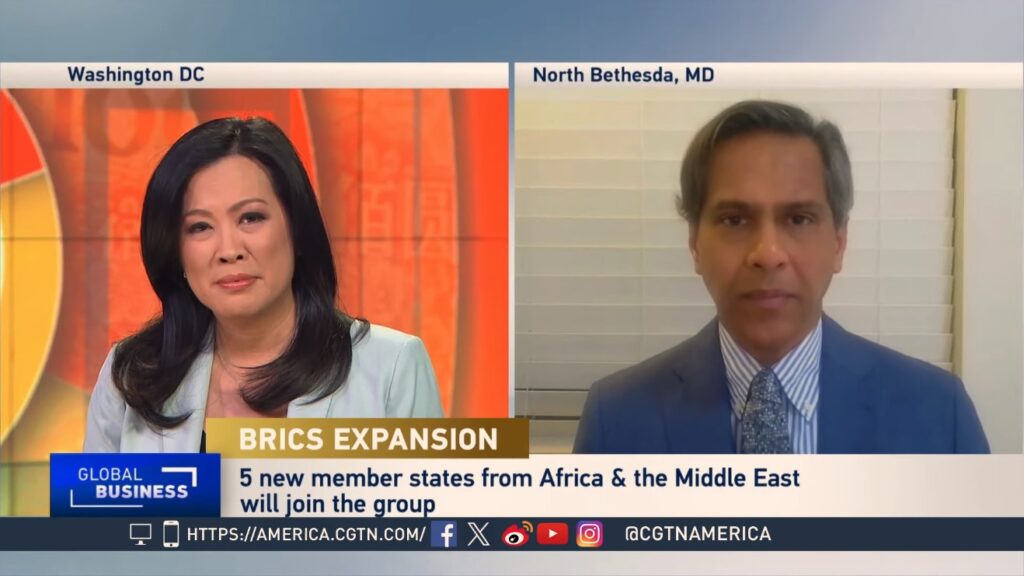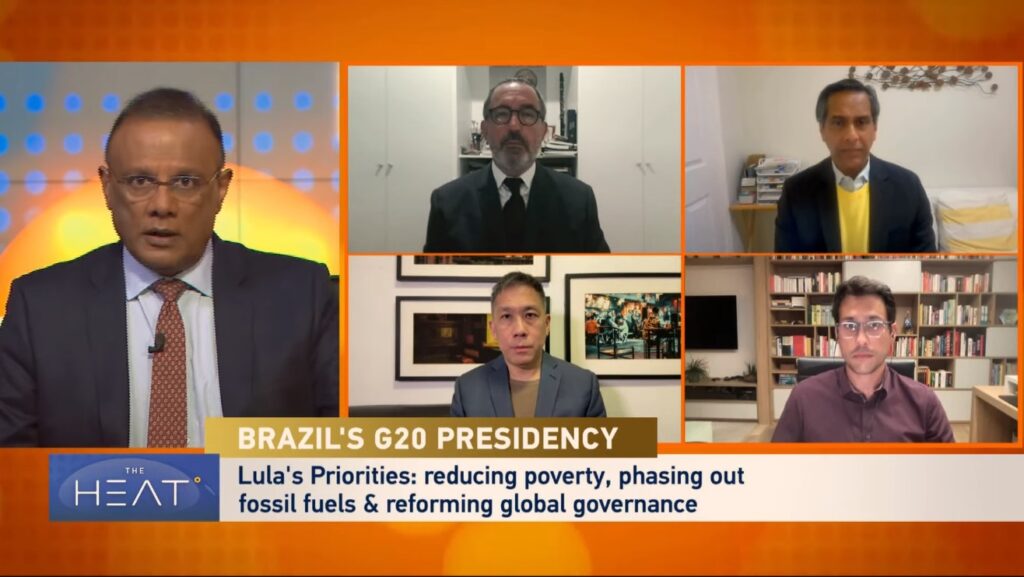
ICAS Bulletin (online ISSN 2836-3418, print ISSN 2836-340X) is published every other week throughout the year at 1919 M St NW, Suite 310, Washington, DC 20036.
The online version of ICAS Bulletin can be found at chinaus-icas.org/bulletins/.

– On January 13, after more than a year of waiting, Taiwan’s 8th presidential elections were held as part of the 2024 general elections. Lai Ching-te of the Democratic Progressive Party was subsequently elected president. Shortly after the election results were announced, the Pacific island nation of Nauru broke ties with Taipei, which one U.S. official described as “unfortunate.”
– On January 15, an unofficial delegation of former U.S. officials met with Taiwan President Tsai Ing-wen and her newly elected successor Lai Ching-te in Taipei.
– Following Taiwan’s presidential election, U.S. President Joe Biden, speaking to the press in front of The White House, said “We [the U.S.] do not support independence.”
– Five days before Taiwan’s elections, Chinese Ambassador to the U.S. Xie Feng said that “the Chinese government simply has no room for compromise” on Taiwan independence while also noting positive developments in U.S.-China relations in recent months.
– The Taiwan elections have brought to their heads several conversations on disinformation and public opinion.
Associated News References:
“US decries Nauru’s ‘unfortunate’ ditching of Taiwan, warns on China’s promises,” Reuters, January 16
“U.S. delegation meets with Taiwan’s next president as Nauru switches ties to China,” NBC News, January 15
“Biden says US does not support Taiwan’s independence following election,” The Hill, January 13
“Beijing Has No Room to Compromise on Taiwan, China’s Top Envoy Says,” Bloomberg, January 10 [Paywall]
“Taiwan election: China sows doubt about US with disinformation,” BBC, January 7

– Naura Technology Group, a major Chinese chip-tool company, forecasts a significant increase in its market share in China and a 50% year-on-year revenue growth in 2023, due to U.S. export controls.
– During a phone call on January 11, China’s Commerce Minister Wang Wentao raised “serious concerns” to U.S. Commerce Secretary Gina Raimondo about U.S. restrictions on chip-making lithography machines and the investigation into American semiconductor supply chains.
– House panel urged the Biden administration to take stronger measures, including potential tariffs, to counter China’s growing dominance in the production of older-generation microchips crucial for U.S. industries.
– Sources indicate that U.S. chipmaker Nvidia plans to mass-produce artificial intelligence (AI) chips specifically for China in the second quarter of 2024, in compliance with U.S. export rules.
– President Biden is preparing to maintain many of Trump’s tariffs on Chinese imports, with potential adjustments on electric vehicles and critical minerals, as part of a strategic approach towards China and to demonstrate a tough stance ahead of his re-election bid.
Associated News References:
“Tech war: Chinese chip-tool giant Naura forecasts surge in 2023 sales on strong local demand amid US export controls,” South China Morning Post, January 16 [Paywall]
“China raises ‘serious concerns’ over US restrictions on chip-making machines, supply chain investigation,” South China Morning Post, January 11 [Paywall]
“Biden Urged to Curb China’s Dominance of Older-Generation Chips,” The Wall Street Journal, January 8 [Paywall]
“Nvidia to launch China-focused AI chip in Q2 2024 – sources,” Reuters, January 8
“Scoop: Biden preparing to keep many of Trump’s China tariffs,” Axios, January 5

– After the departure of long-time climate envoys John Kerry and Xie Zhenhua, the U.S. and China are navigating a new path in climate cooperation, with challenges ahead in sustaining progress and leadership transitions amidst global political dynamics.
– As a group of 10 Chinese state ministers will reportedly be traveling to Davos, Switzerland for the World Economic Forum, U.S. diplomats are trying to confirm Secretary of State Antony Blinken will also have a meeting with a Swiss official while there for the Forum.
– In a speech to mark the 45th anniversary of formal U.S.-China diplomatic ties, Chinese Foreign Minister Wang Yi called for peaceful coexistence for the U.S. and China and promised the return of pandas.
– Wang Yi also warned the U.S. that decoupling would be counterproductive while citing recent improvements in diplomatic relations.
Associated News References:
“US, China Start New Climate Era After Veteran Envoys Step Down,” Bloomberg, January 15 [Paywall]
“A big Chinese delegation unnerves U.S. diplomats in Davos,” Politico, January 15
“China calls for peaceful coexistence and promises pandas on the 45th anniversary of U.S.-China ties,” AP News, January 5
“Top China Diplomat Warns of Decoupling Risk Even as Ties Improve,” Bloomberg, January 5 [Paywall]

– Apple Inc. has decided to use rare discounts to combat declining sales in its Chinese market overseas.
– BOE Technology Group, the supplier of Apple, has signed a contract worth US$9 billion to plan the construction of a next-generation display production base in Chengdu, a city in southwestern China.
– A statement from China’s Justice Bureau indicates that a Chinese company has successfully broken Apple’s AirDrop encryption, which enabled them to identify individuals who used AirDrop to spread “inappropriate remarks” on public transportation.
– A committee of the U.S. Congress has requested the U.S. Department of Commerce to investigate G42, a large tech company specializing in artificial intelligence and other emerging technologies, which is also controlled by the ruling family of the United Arab Emirates, to determine if it should face trade restrictions due to its ties with China.
Associated News References:
“Apple Goes on the Offensive as iPhone Sales Slip in Its Biggest Overseas Market,”The Wall Street Journal, January 16 [Paywall]
“Apple supplier BOE signs US$9 billion deal to build next-generation display plant in southwestern China,” South China Morning Post, January 11 [Paywall]
“Chinese company can now break AirDrop encryption, state government claims,” Axios, January 10
“Microsoft Debates What to Do With A.I. Lab in China,” The New York Times, January 10 [Paywall]
“Lawmakers Push U.S. to Consider Trade Limits With A.I. Giant Tied to China,” The New York Times, January 9 [Paywall]

– Chinese state media Global Times released warnings on a report by Washington-based think tank CSIS which calls Chinese Indian Ocean scientific research vessels threats.
– A sailor in the US Navy was sentenced to 27-months in prison for espionage after he sent photos of U.S. military installations and exercises to a Chinese intelligence officer.
– On January 14, China’s Foreign Ministry announced new sanctions on five U.S. defense industry companies over their arms sales deals to Taiwan.
– U.S. intelligence has assessed the reason for Chinese President Xi Jinping’s ‘sweeping military purge’ was rooted in widespread corruption which impeded his modernization efforts and potentially China’s warfighting capabilities.
– A Chinese naval frigate was spotted observing U.S. and Philippine naval exercises in the South China Sea, adding to tensions over territorial claims and maritime rights in the region.
Associated News References:
“China media warns against taking China’s Indian Ocean research as threats,” Reuters, January 12
“U.S. Navy Sailor Who Helped China Is Sentenced to 2 Years in Prison,” The New York Times, January 9 [Paywall]
“China Sanctions Five US Defense Firms on Taiwan Arms Sales,” Bloomberg, January 6 [Paywall]
“US Intelligence Shows Flawed China Missiles Led Xi to Purge Army,” Bloomberg, January 6 [Paywall]
“Chinese Warships Eavesdrop on Joint U.S., Philippine Naval Drills in South China Sea,” USNI News, January 5
“Dimon Says China Risk-Reward Equation Has ‘Changed Dramatically’,” Bloomberg, January 17 [Paywall]
“Chinese Premier Li calls for global cooperation, says China open for business,” Reuters, January 16
“In moon race with China, U.S. setbacks test role of private firms,” Reuters, January 12
“Shein seeks China’s permission for US IPO -sources,” Reuters, January 12
“Chinese Billionaire Is Second-Biggest Foreign Owner of US Land,” Bloomberg, January 8 [Paywall]
“Washington Heats Up Nuclear Energy Competition With Russia, China,”The Wall Street Journal, January 6 [Paywall]
“Foxconn Expects Sales to Fall as iPhone Doubts Grow,” Bloomberg, January 5 [Paywall]
“Commerce Department Finds Dumping of Tin Mill Product Imports From China, Other Countries,” The Wall Street Journal, January 5 [Paywall]
“Tesla trumps BYD in China sales efficiency with real-time strategy,” Reuters, January 5
January 16 hosted by Center for Strategic & International Studies
January 16 hosted by Wilson Center
January 9 hosted by The Carter Center
January 5 hosted by Center for Strategic & International Studies
January 17 hosted by Georgetown University
January 18 hosted by Center for Strategic & International Studies
January 18 hosted by US-Asia Institute
January 18 hosted by U.S.-China Business Council
January 22 hosted by Foreign Policy
January 23 hosted by Stimson Center
January 23 hosted by Hudson Institute
January 25 hosted by Asia Society
Blue Carbon & Climate Change 2023 Q4 Has Been Released!
The first week of 2024, the ICAS Blue Carbon & Climate Change Program released its BCCC Quarterly newsletter for 2023 Q4. This issue features a ‘Theme of the Quarter’ on “Multinational Climate Engagements” and a ‘Blue Carbon Country Profile’ on ‘The United Kingdom.’
Released each quarter, the BCCC Quarterly records the most important trends and developments regarding blue carbon policies and regulations in China, the U.S., and other regions, as well as international regimes, such as under the United Nations framework. It also includes two special sections—the ‘Theme of the Quarter’ and the ‘Blue Carbon Country Profile’—that aim to bring a fresh and applicable element to each issue.
by Nong Hong
January 11, 2024
Globally, the implementation of Emission Control Areas (ECAs) has become widespread as a means to regulate and mitigate air pollution resulting from maritime activities…the effective implementation of an ECA in the Mediterranean Sea could serve as a catalyst for fostering dialogue and collaboration among South China Sea nations to address maritime pollution…

by Denis Simon
January 12, 2024
The proposal by Chinese President Xi Jinping to host 50,000 American students over 5 years is truly an exciting gesture. Of course, many details about international travel, living costs, host organizations, and the mechanisms by which U.S. students can apply must be worked out. As they say, the devil is in the details.
Clearly, President Xi’s suggestion reflects a growing recognition inside the Chinese government, business and academic circles that our two countries need to work more closely together to ensure that the younger generations develop a deeper and more profound understanding of each other’s cultures, history, society, etc. The capacity of our two countries to work together to address the global challenges facing the world depends quite heavily on our ability to collaborate in an effective, efficient manner…
This commentary was originally released by Xinhua on January 12, 2024
US-China Global Maritime Relations (Routledge, 2024)
By Nong Hong
Release Date: January 1, 2024
This book explores the U.S.-China global maritime relationship, examining the development and implementation of the maritime strategies of both the United States and China.
Delving into the U.S.-China maritime relationship within the global context, the book investigates six key maritime regions: the South China Sea, the Northeast Asia waters (the East China Sea, the Yellow Sea), the Indian Ocean, the South Pacific Ocean, as well as the Arctic and Antarctic regions. Its observations form a comprehensive exploration of these regions and their significance in shaping the dynamics between the two nations, and this analysis reveals that an expanded view is necessary to discover and clearly display the role that these maritime regions currently—and could potentially—play in overarching U.S.-China relations.
Examining both the ongoing conflicts and opportunities for cooperation in the global maritime domain between the United States and China, this book will be a valuable resource to students and scholars of international relations, Chinese and U.S. politics, strategic studies, and maritime studies.

On Saturday, January 13, 2024, Senior Fellow Sourabh Gupta quoted by South China Morning Post on the 2024 Taiwan elections.
On Tuesday, January 9, 2024, Distinguished Fellow Denis Simon was quoted by China Daily on the importance of US-China educational exchanges.
On Tuesday, January 9, 2024, Senior Fellow Sourabh Gupta was interviewed by CGTN America’s The Heat on Brazil and its chairpersonship of the G20 Group of Countries in 2024.
On Wednesday, January 3, 2024, Senior Fellow Sourabh Gupta discussed the expansion of BRICS membership in 2024 on CGTN America’s Global Business.
On Tuesday, January 2, 2024, Senior Fellow Sourabh Gupta was quoted by China Daily analyzing President Xi Jinping’s New Year’s address to the nation.



The Institute for China-America Studies is an independent nonprofit, nonpartisan research organization dedicated to strengthening the understanding of U.S.-China relations through expert analysis and practical policy solutions.
1919 M St. NW Suite 310,
Washington, DC 20036
icas@chinaus-icas.org
(202) 968-0595
© 2025 INSTITUTE FOR CHINA-AMERICA STUDIES. ALL RIGHTS RESERVED.